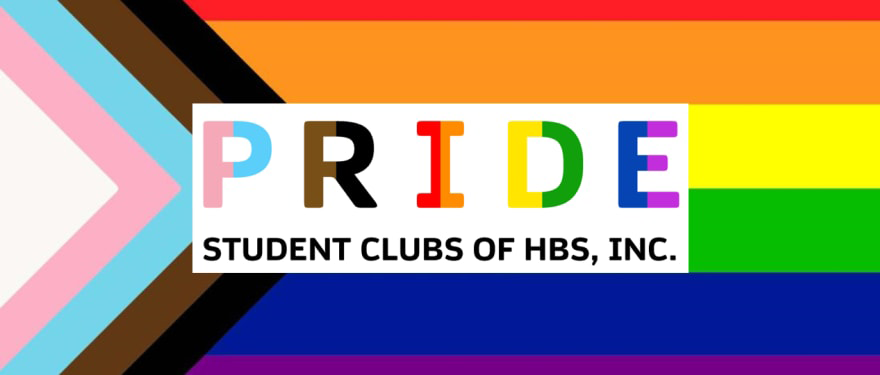National Coming Out Day is October 11, 2020, and HBS will be supporting and participating in events that celebrate the LGBTQ+ community all week long. Some students come out before business school, and some students wait until they arrive on campus. Many who participate in events choose to keep their LGBTQ+ status private. We accept everyone in any stage of their coming out process and hope that you will be inspired by the stories of these students as they continue to grapple with a world that is not always accepting of who they are. Now, during this period of wild uncertainty – and, for many, anxiety and loneliness – our visibility and representation matter more than ever.
Here, students share their personal stories through the National Coming Out Day student storyboard series organized by the PRIDE club. Visit our Instagram @hbsadmissions and @prideathbs for more information and features about the LGBTQ+ community here at HBS.
Ryan Flamerich, (he/him/his), Class of 2021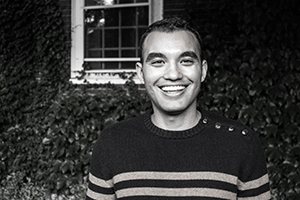
“Being gay is the best thing that has ever happened to me. It just took me a long time to realize it.
I grew up in a devoutly Catholic family in South Florida before moving to Birmingham, Alabama, in middle school. While these communities have very little in common, I found it striking that the names I was called by fellow students in both places were remarkably similar. How does one come out when others seemingly knew you were gay before you did? How does one feel safe to come out when others have already made your sexuality a negative attribute to prescribe to you?
Coming out for me was an avalanche; there isn’t a singular moment I can look to and say, ‘this is when I came out.’ Instead, there are several moments, each larger than the other, when I chose to accept myself and share my full self with the world. Not everyone welcomed the news, but the struggle to find acceptance wasn’t my burden to carry any more.
Things changed as I got older and realized I wasn't alone. Being gay is more than a shared identity, it is a community whose bonds are built on seemingly disparate but common experiences. The weight we all carried allows us to work harder, love stronger, and live more vibrantly. Being gay isn’t a community it’s a family.
When you’re ready to come out, you won’t be alone.”
Charlotte Lawson MD (she/her), Class of 2022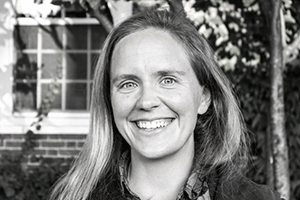
“In my first week of tenth grade, a new sexual education teacher stepped into our suburban Northern Virginia prep school and identified herself as a lesbian. Her coming out story was brief, matter-of-fact and cheerful. It was not a big deal.
But for the rest of the semester, every time we stepped into her classroom, I felt anxious. I sensed that this teacher knew I questioned my feelings for women; and these thoughts felt unsafe. To this day, entries about my sexuality are the only ones I have ever destroyed from my journal.
It took 14 more years and a painful divorce for me to finally come ‘all the way out.’ At Thanksgiving in 2016, I showed up to the large family gathering without my ex-husband and the rumor mill began to churn. The only thing scarier to me than coming out to my beloved Grandma Rosie was the fear that she might learn of it from someone else.
So, seventeen days after the election, I tearfully told my Trump-supporting, devoutly Catholic grandmother the truth. She listened carefully. When I finished she embraced me and observed, ‘That must have been very hard for you to share.’ I nodded with relief and realized how little credit I had given her unconditional love for me.”
Bailey Wilton (she/her/hers), Class of 2022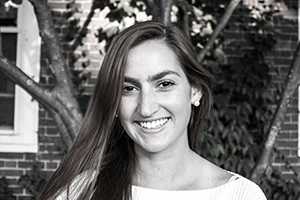
“The first time I came out to someone, it was with a single word: ditto.
A few weeks after moving in together, I was eating dinner with my roommates, and one of them mentioned she had something important to tell us. She then went into a long speech about how despite having a boyfriend, she also likes girls, but hopefully this doesn’t make us uncomfortable, she’s not hitting on us, etc. After a while of her speaking, she looked to us for a response. In a moment of incredible eloquence, I responded with ‘ditto.’ (The other roommate mentioned that she was straight, but very happy for us.)
I wasn’t planning on coming out that night. I had never met another bisexual person, and I’m not even sure I fully realized that was the right word for myself until then. But just knowing that there was someone else like me, someone else who understood, was such an incredible relief.
It took a bit more time, and meeting a few more bi people, for me to decide to fully come out to others in my life. Now, I choose to be visible because I never want to cause anyone else to question whether there are others like them. Because everyone deserves to have their ‘ditto’ moment.”
Carter Frazee (he/him/his), Class of 2021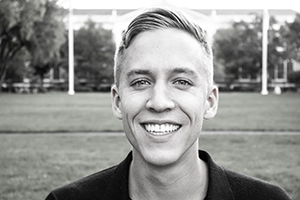
“As a conflicted Catholic from Ohio, I packed my bags and made my way to New York City at 18 years old. New city, new school, new chapter, new identity. First day of college with a fresh start where no one knew who I was before – I could be anyone I wanted to be and I chose to finally be myself.
Today, I am proud of who I am, proud of my community and proud of the progress we’ve made. Now, I live every day unapologetically true to myself – I’ve already spent too many years hiding the best parts of my identity.”
Cassidy Tanner (she/her/hers), Class of 2021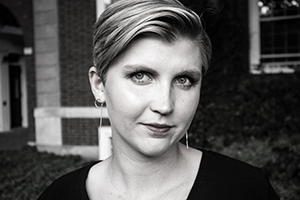
“The term ‘coming out day’ implies that coming out is a one-time experience – a closet door that you only have to walk through once. In reality, coming out as a bisexual woman is more like a chronic condition. I am constantly faced with moments where I have choose: to disclose, ‘come out,’ and be fully authentic, or to cover, lie, and omit.
These moments are generally caused by assumptions of heterosexuality. When dating women or nonbinary folx, my longing to refute those assumptions is restrained by fear. An Uber driver asks if I’m heading to my boyfriend’s place and I am paralyzed – I want to correct ‘boyfriend’ to ‘girlfriend,’ but I’m afraid of being trapped in a car with his reaction, be it revulsion, voyeuristic interest, or violence. Instead, I smile, nod, and feel so, so small.
When single or dating men, the assumption that I’m straight is even more prevalent. Sometimes, shamefully, I want to let it slide. It would certainly be easier – no invasive interrogations, no ‘making a scene’ by mentioning my queerness, no fear. What do I have to lose by staying quiet?
The answer is: The ability to let those I love truly know me. The knowledge that those who love me do so truthfully and fully. My community. My identity. Myself.”
Stephanie Myles (she/her/hers), Class of 2021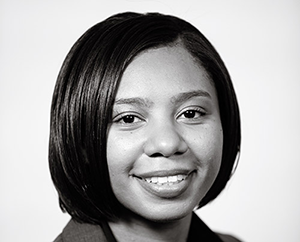
“I read fanfiction that involved women being together. I watched the L-Word online. I was a huge TiBette fan. I perused online forums for queer POC. By age 14, I was in a long-distance relationship with my first girlfriend. Quiet as kept, I navigated my life’s experiences while hiding an integral part of myself from society. A part that I knew would be met with judgment, rejection, and disdain.
I was in my mid-20s before I came out. I’d been one of the first persons in my family to go to college, relocate to a new state, and sustain a livelihood on my own. Having the time and space to openly express my sexuality had been lower on my priority list at the time. Until I decided to fully embrace who I was and celebrate the beauty in being different.”
Morgan Sheil (she/her/hers), Class of 2021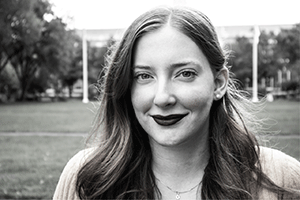
“For me, coming out is both past and present. My journey started in middle school, when a group of kids decided to bully me by saying I was gay and ostracizing me. I didn’t know what being gay meant, but I remember how terrified I was that something must be ‘wrong’ with me. It wasn’t until I was in graduate school in my mid 20s that I was able to be fully out and queer, but letting go of that fear has been a process.
After college I worked conservative industries, like oil & gas and logistics, and I struggled with balancing authenticity and personal safety. I was not out at work, nor to work friends, and it was exhausting. HBS is the start of a new journey for me. It has been wonderful to be part of the larger LGBTQ+ community, and to plan a future where I don’t have to hide who I am. I still come out on a regular basis when I meet new people, but telling the truth is so much easier than telling a lie. I hope that all of the scared 13-year-olds have the opportunity and grace to grow into their truths, and to know that life gets better."

